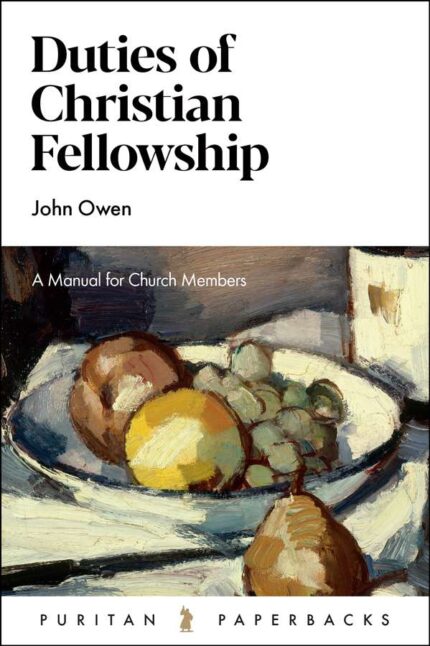Duties of Christian Fellowship by John Owen

Introduction
As Christians, we are called to love and serve one another, to build each other up in faith and practice, and to seek the common good of our communities. But too often, we fall short of this ideal, succumbing to pride, selfishness, and division. How can we bridge the gap between our aspirations and our realities, and build stronger relationships within our churches?
Enter John Owen’s “Duties of Christian Fellowship“ a classic treatise on the nature and responsibilities of communal life among believers. Originally published in the 17th century, this work remains relevant and insightful today, offering practical guidance for fostering mutual edification, accountability, and unity within our congregations.
In this article, we will explore the key insights from Owen’s work, and how we can apply them to our own lives and communities. From the importance of active participation to the practice of forgiveness and patience, these duties provide a roadmap for building stronger relationships within the body of Christ.
The Duties of Christian Fellowship
Duty 1: Active Participation
According to Owen, the first duty of Christian fellowship is active participation. This means more than simply attending church services or events; it requires a willingness to engage with others, to share our lives and experiences, and to contribute to the growth and flourishing of the community as a whole.
Some key practices of active participation include:
- Regular attendance at church services and activities
- Intentional engagement with other members of the community, through conversations, small groups, and other forms of interaction
- Volunteering and serving in various capacities, from hospitality to worship to outreach
- Offering our time, resources, and skills to support the needs of others
By actively participating in the life of the community, we demonstrate our commitment to the common good, and we build stronger bonds of trust and mutual support with our fellow believers.
Duty 2: Mutual Edification
The second duty of Christian fellowship is mutual edification, or the practice of building each other up in faith and practice. This involves not only receiving instruction and encouragement from others, but also offering it ourselves, in a spirit of humility and grace.
Some key practices of mutual edification include:
- Listening actively and attentively to others, seeking to understand their perspectives and experiences
- Offering wise counsel and guidance when appropriate, based on our own knowledge and experience
- Encouraging and affirming others in their gifts and talents, and helping them to develop and use these for the benefit of the community
- Being open to correction and rebuke when necessary, and responding with humility and a willingness to learn and grow
By engaging in mutual edification, we create a culture of learning and growth within the community, where each member is valued and supported in their journey of faith.
Duty 3: Accountability
The third duty of Christian fellowship is accountability, or the practice of holding one another responsible for our actions and attitudes. This involves not only confronting and correcting sin and error, but also supporting and encouraging each other in the pursuit of righteousness and holiness.
Some key practices of accountability include:
- Speaking the truth in love, even when it is difficult or uncomfortable
- Encouraging others to confess their sins and seek forgiveness, and extending forgiveness and grace in return
- Holding each other to high standards of
behavior and character, and challenging each other to grow and mature in Christ
- Praying for and with each other, and seeking God’s guidance and wisdom in all our interactions
By embracing accountability, we create a culture of honesty, integrity, and transparency within the community, where each member is held to a high standard of Christ likeness.
Duty 4: Forgiveness
The fourth duty of Christian fellowship is forgiveness, or the practice of extending grace and mercy to those who have wronged us, and seeking reconciliation and restoration in our relationships. This requires a willingness to let go of our anger, bitterness, and resentment, and to extend compassion and understanding to those who have hurt us.
Some key practices of forgiveness include:
- Seeking to understand the other person’s perspective, and empathizing with their feelings and experiences
- Acknowledging our own role in the conflict or offense, and seeking to make amends as necessary
- Extending grace and mercy, even when it is not deserved, and seeking to restore the relationship to a place of trust and mutual respect
- Letting go of our own hurt and pain, and entrusting it to God’s care and healing
By practicing forgiveness, we create a culture of grace, love, and reconciliation within the community, where broken relationships can be healed and restored, and where trust and unity can be rebuilt.
Duty 5: Patience and Humility
The fifth duty of Christian fellowship is patience and humility, or the practice of putting the needs and interests of others ahead of our own, and submitting to one another in love. This requires a willingness to listen, learn, and grow, and a recognition that we are all in need of God’s grace and mercy.
Some key practices of patience and humility include:
- Respecting the opinions and perspectives of others, even when they differ from our own
- Avoiding harsh words or actions that might cause offense or division
- Seeking to learn from others, especially those who are different from us in background, experience, or perspective
- Acknowledging our own limitations and weaknesses, and seeking help and support from others when needed
By practicing patience and humility, we create a culture of mutual respect, understanding, and empathy within the community, where each member is valued and appreciated for their unique gifts and contributions.
FAQs
Q: What is the “Duties of Christian Fellowship” by John Owen?
A: The “Duties of Christian Fellowship” is a classic treatise on the nature and responsibilities of communal life among believers, written by the 17th century theologian John Owen.
Q: What are the key insights from the “Duties of Christian Fellowship”?
A: The “Duties of Christian Fellowship” outlines five key duties of Christian fellowship: active participation, mutual edification, accountability, forgiveness, and patience and humility.
Q: How can I apply these duties to my own life and community?
A: By embracing these duties, we can build stronger and more meaningful relationships within our churches, fostering a culture of mutual support, trust, and growth.
Conclusion
In conclusion, the “Duties of Christian Fellowship” offers a powerful framework for building stronger relationships within our churches, and for living out the call to love and serve one another as Christ has loved us. By embracing these duties, we can create a culture of mutual support, accountability, and grace, where each member is valued and appreciated for their unique gifts and contributions. As we seek to live out these duties in our own lives and communities, may we be empowered by the Holy Spirit to love and serve one another with humility, patience, and grace.
Quote
"Believers are united together in one body, and ought to have a mutual care of and love to each other."
"We cannot enjoy the privileges of the gospel, nor perform its duties, without fellowship."
"Our aim in Christian fellowship is to promote the glory of God, the edification of the church, and the growth of our own souls."
"We are not to have fellowship with the world in its sinful practices, but rather to reprove and oppose them."
"Accountability is necessary for growth and maturity in Christ, and must be embraced by all members of the community."
"Forgiveness is essential for healing and restoration in relationships, and requires a willingness to extend grace and mercy to others."
Duties of Christian Fellowship
Duties of Christian Fellowship deals with a matter of perennial concern for every truly Christian church.…



